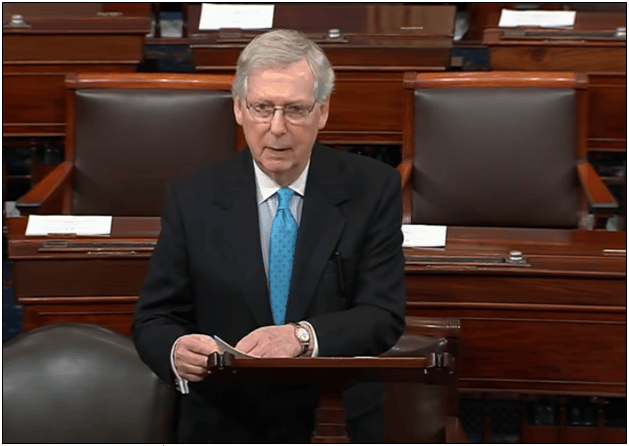Aug. 22, 2022
Permission to republish original opeds and cartoons granted.
Yes, Senate Minority Leader McConnell, it’s harder to win the Senate than the House — but that’s always true

By Robert Romano
"I think there's probably a greater likelihood the House flips than the Senate.”
That was Senate Minority Leader Mitch McConnell (R-Ky.) on Aug. 18 at the Northern Kentucky Chamber of Commerce, handicapping the Nov. 2022 Congressional midterms, giving Republicans greater odds to win back the House than the Senate.
But that would be true in any year. In midterm elections dating back to 1906 through 2018, the party that occupied the White House lost seats in the House 27 out of 30 times, or 90 percent of the time, with losses averaging 31 seats. The exceptions were 1934, 1998 and 2002, when the incumbent party was able to pick up seats in the House.
In the Senate, comparatively, the incumbent party lost seats 21 out of 30 times, or 70 percent of the time, with losses averaging three seats in the Senate.
So, as a strict matter of probabilities and history, McConnell is correct, while Congressional midterms favor picking up seats in both the House and the Senate, the odds are definitely greater that the Republicans will be able to do so in the House.
McConnell attributed the difference in odds between the House and the Senate to Senate races’ statewide character and “candidate quality”: “Senate races are just different, they're statewide. Candidate quality has a lot to do with the outcome."
Here, McConnell appeared to be complaining about the slate of candidates that had been backed by former President Donald Trump in the Republican Party’s primaries this year, including Mehmet Oz in Pennsylvania, Herschel Walker in Georgia and J.D. Vance in Ohio.
That was certainly how former President Trump took it. On Truth Social on Aug. 20, Trump hit back, stating in part, “Why do Republicans Senators allow a broken down hack politician, Mitch McConnell, to openly disparage hard working Republican candidates for the United States Senate. This is such an affront to honor and to leadership. He should spend more time (and money!) helping them get elected…”
Here, Trump has got a point. Usually, opposition parties are able to capitalize on boosted enthusiasm of the party faithful in a midterm cycle, but if party leaders are undermining candidates publicly, a united front might begin to crumble.
In the meantime, the real reason it is relatively easier to pick up seats in the House in the midterms than in the Senate owes a lot to the fact every single seat nationally is up for grabs every two years in the House. Whereas in the Senate, much depends on which seats are up — by constitutional design, only one-third of the Senate comes up for election every two years — which can have a tremendous impact on the outcome in November.
The reason for the design by the Framers was to ensure that while the House would largely be in tune with the mood of the public every two years, two-thirds of the Senate is not up for election, insulating that body from sudden changes in the body politic.
In 2022, Republicans will be defending more seats than Democrats, 20 seats to 14 seats, including seats in Pennsylvania, Wisconsin, Ohio and North Carolina that are considered potential pickups for Democrats. Of the seats Democrats are defending, Georgia, Arizona, New Hampshire, Nevada and Colorado are thought be to be gettable by the GOP.
On one hand, with President Joe Biden with historically low approval ratings and the GOP with some momentum on its side, this might seem to be a good year for Republicans to be defending seats, because conditions mean it is more difficult to flip GOP seats this year. But with Democrats defending fewer seats, that also means there are relatively fewer opportunities for Republicans to pick up seats.
Were that situation reversed, Republicans would have perhaps have more of a margin for error in some of the Senate races.
Yes, many of these candidates got Trump’s endorsement, but they also got the votes of Republican Party voters who expect the party to do everything to win in November.
Now, it is up to McConnell — and also House Minority Leader Kevin McCarthy (R-Calif.) — to make both of those things work. Instead, if Republicans hope to win back both chambers of Congress this year, party leaders will almost certainly need to unite, especially now that the party’s primaries are largely over. Stay tuned.
Robert Romano is the Vice President of Public Policy at Americans for Limited Government.
To view online: https://dailytorch.com/2022/08/yes-senate-minority-leader-mcconnell-its-harder-to-win-the-senate-than-the-house-but-thats-always-true/
Video: Arizona U.S. Representative Paul Gosar: We Need to Return to Equal Application of the Law

To view online: https://www.youtube.com/watch?v=HzQjtSGgr5w
Video: The Only Poll Liz Cheney Will Ever Win Again

To view online: https://www.youtube.com/watch?v=Vxt8Qx-_A_E


Mollie Hemingway: Come On, Mitch McConnell, Republicans Need You To Step Up And Lead
By Mollie Hemingway
Senate Minority Leader Mitch McConnell was asked yesterday about Republican prospects for the November elections.
“I think there’s probably a greater likelihood the House flips than the Senate. Senate races are just different, they’re statewide, candidate quality has a lot to do with the outcome,” McConnell replied.
The media and others on the left were of course thrilled with the Republican leader’s “notable quotable” disparagement of Republican candidates and the voters who chose them, which somehow came off even worse on video.
What was McConnell thinking? What in the world was he thinking?
Unnecessarily ceding an incredibly winnable Senate to Democrats three months before an election is a great example of the leadership choices that have led McConnell to be the least popular national politician in the country, according to the RealClearPolitics average. And it’s a good example of why so many Republicans — grateful as they may be for his successes — think it’s time for new leadership.
Still, for the time being, McConnell is the top elected Republican, and he has an obligation to effectively lead the Republican team, respecting the voters and who they have chosen.
In this case, having a nearly opposite response about Republican prospects rather than the pouty and clinical one McConnell offered would have been strategically and politically wise. It also would have matched much more with the reality of the political environment.
Republicans vs. Democrats
To understand the utterly bizarre nature of McConnell’s response, a few reminders are in order.
Of the 14 Senate seats that are in contention, two are considered safe for Democrats, one leans Democrat, two are considered safe for Republicans, one leans Republican, and the remaining eight are toss-ups, according to polling averages.
The country is 18 months into Democrats’ total rule, and by nearly every measure the results of their political control are utterly disastrous. The southern border has essentially been erased. Inflation is reminiscent of the 1970s, as is the energy policy causing high gas prices and reliance on other countries. Consumer confidence has cratered. War with nuclear powers is dangerously close in at least two parts of the world. The economy should be roaring out of the pandemic, but it’s returned to Obama-era sluggishness or worse. Woke mobs are completing their destruction of the country’s institutions. Democrats are persecuting political opponents with their deeply unpopular J6 star chamber.
More than 70 percent of Americans say the country is moving in the wrong direction, according to the RealClearPolitics average. Americans are clearly not happy with the quality of leadership coming out of Washington, D.C.
And in this milieu, Republican voters who care deeply about their country have chosen a slate of extremely interesting candidates, many of them non-career politicians. Particularly compared to the crop of senators currently in Washington, they are all extremely talented and impressive people. This is something to highlight and praise, not lament. Having non-career politicians running is a good thing, not a bad thing,
Herschel Walker, Mehmet Oz, J.D. Vance, and Blake Masters are successful and impressive people in a variety of careers. Even the more traditional politicians running for re-election — Ron Johnson and Marco Rubio — are among the better senators in office. Adam Laxalt, running against an incumbent Nevada Democrat, is a highly decorated former Naval officer and Iraq War veteran. He was an incredibly successful attorney general in Nevada.
These are not bad candidates! If you can’t work with this level of quality, you can’t work with anyone. And they’re running against a crop of extreme and discredited candidates that a competent Republican leader should have no problem talking about, given the slightest opportunity. John Fetterman, an ostensibly grown man running for the Senate from Pennsylvania, is still supported by his parents. Raphael Warnock, trying to keep his Georgia seat, is a troubled man with an extreme voting record. Mark Kelly has envious funding but an extreme voting record and the personality of a fish.
More importantly, the Republicans won their nominations by running on the policies that have so reinvigorated and expanded the party. They have clear messages about helping out middle-class workers and their families, protecting the country from open borders and wasteful wars, and defending American values and freedom against leftist authoritarians.
It is political malpractice to pout and run them — and the voters who selected them — down. Republican voters came out in droves to nominate these candidates. They like them! McConnell, who is unfortunately quite politically unpopular — but who is the top elected leader of the party — should be taking every opportunity to sing their praises and push a unifying and expansive message nationally.
McConnell has a reputation for being a pessimistic individual, but he is more than capable of singing praises when he feels like it. He went out of his way to praise and congratulate Liz Cheney — not even a senator — when she initially defeated an effort to oust her from Republican leadership on account of her obsessive opposition to President Donald Trump. That obsession grew so extreme that Republican voters took matters into their own hands and decisively crushed her re-election bid this week in the Wyoming primary.
If McConnell can praise the politically toxic House member Cheney, surely he can take every opportunity to praise the men and women currently trying to help Republicans take back the Senate, no? To do otherwise risks seeming petulant about McConnell not getting his preferred pick in some of these tight primaries.
Money and Passion
As Republican voters decried McConnell’s curious decision to aid and comfort Democrats months before a tight election, some of his supporters defended him on the grounds that his political action committee is spending money on many of these races.
Money, which goes to political consultants, is important. But the measure of success isn’t fundraising dollars given to consultants, but victory in November.
Enthusiastic and motivated voters — the type the country saw this primary season — are preferable even to huge piles of cash. Periods of political excitement, such as the one the country has been in this past decade, result in outsider candidates, some of whom can’t defeat incumbents or win tight races. Sometimes you get a real clunker. But it’s still better to embrace the enthusiasm and excitement than run boring establishment candidates who also frequently risk loss.
One thing that depresses many Americans who vote Republican or can be persuaded to do so is seeing how little Republicans do to stop Democrat policies. To this end, McConnell’s current leadership strategy of having Republicans either help Democrats pass legislation or not really try to stop it, seems unwise. One voter called his legislative approach this Congress a “voter enthusiasm killing spree.”
It’s not just about what has been done, but what could be done in the future, too. When House Republican leader Kevin McCarthy set about to create an action plan for when Republicans take the House, McConnell said he thought it would be sufficient to run against Biden’s record. This misreads the mood of the country, which, as noted above, is extremely dissatisfied and seeking not just rhetoric but real policy changes to help heal the country.
McConnell has many strengths, even if his more vociferous critics are unwilling to admit them. He has done good work, particularly with judicial nominees. He prides himself on playing effective small ball to accomplish legislative victories. He has many powerful connections and does a good job raising money.
But at this moment, McConnell simply must be a better leader. As the top elected Republican in the country, he should be ecumenical in his support for all Republican candidates for Senate, becoming their biggest cheerleaders on a national stage. It’s understandable that an establishment figure such as himself might have preferred candidates more like himself, but he should set aside his hurt feelings for the sake of the party and country. He should motivate and energize the Republican voters while reaching out to those who can be persuaded to become Republican voters. He should learn how to fight the left-wing media that daily seek Republicans’ destruction, rather than kowtowing to them. He should be envisioning a bold legislative strategy to help save the country.
Mitch McConnell is the top elected Republican in the country. He has an obligation to immediately and dramatically improve his performance of these obvious, basic, and rudimentary political skills.
To view online: https://thefederalist.com/2022/08/19/come-on-mitch-mcconnell-republicans-need-you-to-step-up-and-lead/

